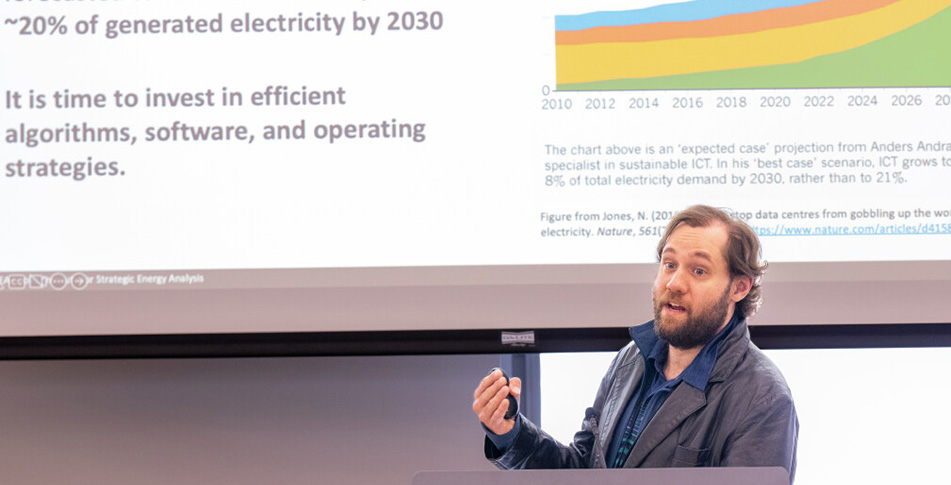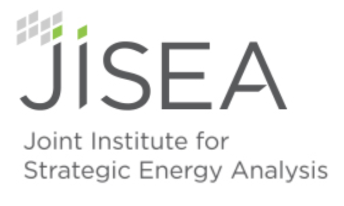Catalyzer Leading Path to Greener Computing

Charles Tripp, NREL senior researcher and Green Computing Catalyzer lead, presents on the Green Computing Catalyzer’s efforts at the 2023 JISEA Annual Meeting. Photo by NREL
Nov. 30, 2023 – While enabling innovative technological advancements, the worldwide growth in advanced computing has created a looming energy crisis. Continued innovation and efficiency gains are imperative to avoid future explosive growth in energy used for computing; however, there is little established research on how we can better design algorithms, schedule and distribute compute jobs, integrate data centers to the grid, and measure and verify computational energy intensity to reduce computing’s environmental impact and increase its resilience.
The Joint Institute for Strategic Energy Analysis (JISEA) launched the Green Computing Catalyzer to cultivate and scale the green computing capabilities at the U.S. Department of Energy’s National Renewable Energy Laboratory (NREL). In its second year, the catalyzer is focused on bringing efficiency and accountability to computing-based research around the globe.
Facilitating Energy-Efficient Computing for HPC Users
To better understand the magnitude and intricacies of energy usage in supercomputing, NREL instrumented its supercomputers, used by researchers both inside and outside of NREL, with node-level sensors that provide granular metrics of their systems. The Green Computing Catalyzer is partnering with researchers from NREL’s Computational Science Center to make the energy consumption data gathered from these sensors widely available to researchers, to provide the information necessary to choose approaches with not only the best raw performance, but also optimal energy efficiency. The end goal is for any researcher who uses NREL’s computing facilities to understand the energy consumption of their computations and report some degree of the energy data in their publications.
"We want to encourage researchers to include computing energy consumption data as a part of their publications," said Charles Tripp, lead of the JISEA Green Computing Catalyzer and senior researcher in the Computational Science Center. "This draws attention to the energetic cost of computing and sets a standard for accountability in this area of research."
Leading Green Computing Efforts Outside of NREL
In addition to developing approaches for more energy efficient computing at NREL, the Green Computing Catalyzer is working to equip researchers around the world with the tools needed for more energy-efficient algorithm design.
Researchers from NREL’s Computational Science Center recently compiled a public data set of real-world algorithmic performance metrics and ran millions of computational experiments over three HPC systems reaching a rate of 4 million node hours per year. This substantial amount of computing provided data on the performance of various configurations of algorithms, input data, and hardware. The Green Computing Catalyzer is now working to augment the data set with energy efficiency data. The dataset, called the BUTTER Empirical Deep BUTTER Empirical Deep Learning Data Set Data Set, is the first of its kind.
"There are very few publications out there in computer science that are publishing the energy consumption of their approaches on real systems," Tripp said. "While most publications provide estimates, publishing real-world data is a new frontier."
Making the data available can help researchers determine how to spend their computational energy wisely and what energy costs they might incur when training models. Researchers are also working to compile and publish similar data sets for cryptocurrency and blockchain calculations.
A Plan for the Future of Green Computing Research
As green computing research gains greater attention and efforts expand, the Green Computing Catalyzer plans to diversify the types of systems it measures to get a more comprehensive understanding of computational energy consumption and address technology challenges that are prevalent in a broader scope of industries. To achieve this, the catalyzer is building its network of industry partners interested in addressing forward-looking computing challenges.
"Investment in computing has traditionally focused on using it as a vehicle to do more complex clean energy research," Tripp said. "But we need to start looking at computing as its own energy efficiency challenge and research domain."
For more information and partnership opportunities, visit the Green Computing Catalyzer page.
